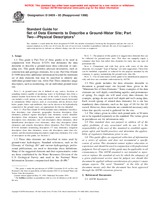Potřebujeme váš souhlas k využití jednotlivých dat, aby se vám mimo jiné mohly ukazovat informace týkající se vašich zájmů. Souhlas udělíte kliknutím na tlačítko „OK“.
ASTM D5409-93(1998)
Standard Guide for Set of Data Elements to Describe a Ground-Water Site; Part Two-Physical Descriptors
Automaticky přeložený název:
Standardní Příručka pro sadu datových prvků , aby Popište podzemní vody stránek ; Část Dva- Fyzikální Deskriptory
NORMA vydána dne 10.12.1998
Informace o normě:
Označení normy: ASTM D5409-93(1998)
Poznámka: NEPLATNÁ
Datum vydání normy: 10.12.1998
Kód zboží: NS-31061
Počet stran: 16
Přibližná hmotnost: 48 g (0.11 liber)
Země: Americká technická norma
Kategorie: Technické normy ASTM
Anotace textu normy ASTM D5409-93(1998) :
Keywords:
Aquifer test, Data confidence classification, Drainage basin, Geohydrologic unit, Geological sample, Ground water, Ground water site construction, Identification descriptors, Monitoring identification, Physical descriptors, Sampling-soil, Site identification, Source agency, Spring site, Surface-water site, Well site, data elements to describe ground-water site-physical descriptors(part, 2), guide, ICS Number Code 07.060 (Geology. Meteorology. Hydrology), 13.060.10 (Water of natural resources)
Doplňující informace
| 1. Scope | ||||||||||
|
1.1 This guide is Part Two of three guides to be used in conjunction with Practice D5254 that delineates the data desirable to describe a ground-water data collection or sampling site. This guide identifies physical descriptors, such as construction and geologic elements, for a site. Part One (Guide D5408) describes additional information beyond the minimum set of data elements that may be specified to identify any individual ground-water site, while Part Three identifies usage descriptors, such as monitoring, for an individual ground-water site. Note 1-A ground-water site is defined as any source, location, or sampling station capable of producing water or hydrologic data from a natural stratum from below the surface of the earth. A source or facility can include a well, spring or seep, and drain or tunnel (nearly horizontal in orientation). Other sources, such as excavations, driven devices, bore holes, ponds, lakes, and sinkholes, that can be shown to be hydraulically connected to the ground water, are appropriate for the use intended. Note 2-Part One (Guide D5408) includes data confidence classification descriptor (one element), geographic location descriptors (four elements), political regime descriptor (one element), source identifier descriptors (four elements), legal descriptors (nine elements), owner descriptors (two elements), site visit descriptors (three elements), other identification descriptors (two elements), other data descriptors (three elements), and remarks descriptors (three elements). Part Three (Guide D5410) includes monitoring descriptors (77 data elements), irrigation descriptors (four data elements), waste site descriptors (nine data elements), and decommissioning descriptors (eight data elements). For a list of descriptors in this guide, see Section 3.1.2 These data elements are described in terms used by ground-water hydrologists. Standard references, such as the Glossary of Geology (1) and various hydrogeologic professional publications, are used to determine these definitions. Many of the suggested elements and their representative codes are those established by the Water Resources Division of the U.S. Geological Survey and used in the National Water Information Systems computerized data base (1-19). Note 3-The purpose of this guide is to suggest data elements that can be collected for ground-water sites. This does not uniquely imply a computer data base, but rather data elements for entry into any type of permanent file. Note 4-Component and code lists given with some of the data elements, for example "Type of Spring," are only suggestions. These lists can be modified, expanded, or reduced for the purpose intended by the company or agency maintaining the ground-water data file. Note 5-Use of trade names in this guide is for identification purposes only and does not constitute endorsement by ASTM.1.3 This guide includes the data elements desirable to document a ground-water site beyond those given in the "Minimum Set of Data Elements." Some examples of the data elements are well depth, contributing aquifer, and permanence of spring. No single site will need every data element, for example, springs do not need well depth and well casing data. Each record (group of related data elements) for a site has mandatory data elements, such as the type of lift for the lift record. However, these elements are considered necessary only when that specific record is gathered for the site. 1.4 The values given in either inch-pound units or SI units are to be regarded separately as the standard. The values given in parentheses are for information only. 1.5 This standard does not purport to address all of the safety problems, if any, associated with its use. It is the responsibility of the user of this standard to establish appropriate safety and health practices and determine the applicability of regulatory limitations prior to use. |
||||||||||
| 2. Referenced Documents | ||||||||||
|
Doporučujeme:
Aktualizace technických norem
Chcete mít jistotu, že používáte pouze platné technické normy?
Nabízíme Vám řešení, které Vám zajistí měsíční přehled o aktuálnosti norem, které používáte.
Chcete vědět více informací? Podívejte se na tuto stránku.




 Cookies
Cookies
